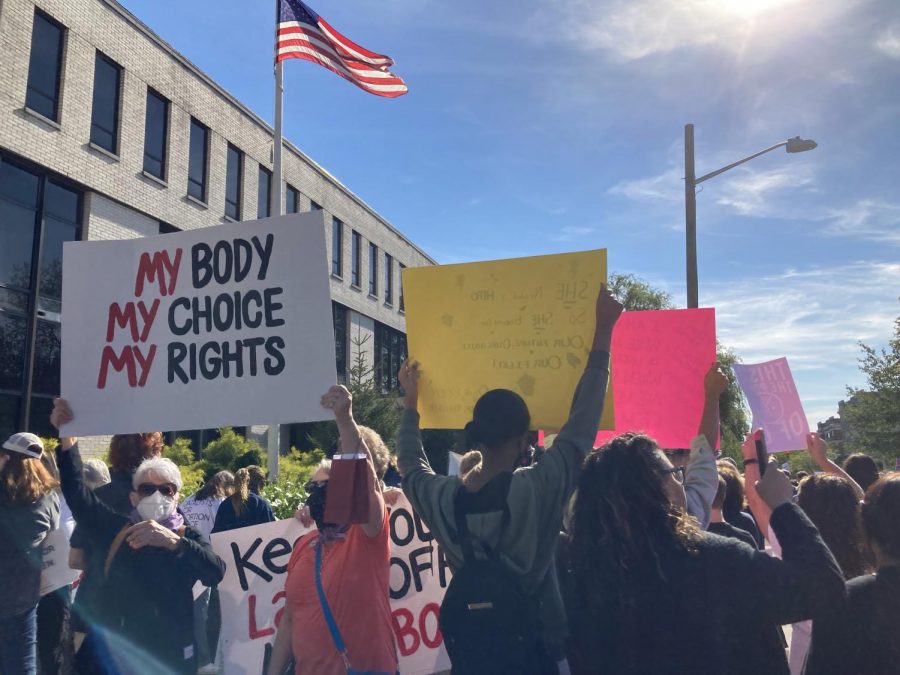Montclair Rallies for Reproductive Rights Amid Competitive Gubernatorial Race
January 19, 2022
Hundreds of Montclairians stand outside the Montclair Municipal Building on Claremont Ave at 10 am on a sunny Saturday morning. In light of Texas’ new abortion legislation which prevents termination of pregnancy after six weeks gestation, communities across the country gathered that same Saturday to protest against it. Although voters across the country will be voting on similar legislation in their own states, this issue is particularly important for New Jersey voters because of the weight it holds in the upcoming gubernatorial election next month.
Among the approximated 800 attendees, many carry signs that say “Keep Abortion Legal”, the trademark of the National Abortion Fund, or “Pass The RFA Now”, referencing the Reproductive Freedom Act, the new reproductive healthcare legislation that Governor Phil Murphy is trying to push through the state legislature.
The Reproductive Freedom Act is a piece of legislation that will ensure the right of every New Jerseyan to make reproductive healthcare decisions for themself. It includes all pregnancy-related care as well as birth control. Gov. Murphy and First Lady Tammy Murphy were at the march to speak and promote the RFA. Pushing his pro-choice agenda and highlighting his accomplishments in funding reproductive healthcare, he contrasted himself to New Jersey’s previous governor, Chris Christie, who worked tirelessly to defund Planned Parenthood throughout his tenure as governor and then presented the cause as one of the cornerstones of his 2015 presidential campaign. Attendees of the march cheered at these statements, actively booing at the mention of the former governor.
Along with the governor, Mayor Sean Spiller and Congresswoman Mikie Sherill (D-NJ) as well as many other diverse voices from the community shared messages. Despite the variety of speakers, there was one clear message: reproductive rights are necessary for all, and everyone should be able to make their own decisions regarding their healthcare with no interference from the government.
Representation of diverse communities at the march
The struggles of LGBTQ+ people were strongly highlighted. Shannon Cuttle, the vice president of both the South Orange Maplewood Board of Education and the Essex County School Board Association, who is also transgender non-binary, spoke of the three difficult years during which they sought a doctor who would work with them on a possible cancerous lump. The doctor who finally provided care for them, Cuttle said, was a Black woman.
“It’s always a Black woman,” remarked a nearby march attendee, “Always.” The disadvantages that women of color face in receiving reproductive healthcare, and healthcare in general, were also highlighted throughout the speeches.
Queer people’s sexual orientation and gender identity often affect their ability to receive healthcare, something that cisgender and/or heterosexual people have no issue with. Specifically, white cisgender and/or heterosexual people. People of color, especially Black and Brown women, have difficulty receiving this care because of the systematic flaws that prevent equity in the healthcare system.
What is often overlooked when making decisions about abortions during the second, or even third, trimester of pregnancy is the occurrence of life-threatening medical conditions that could kill a pregnant woman. Rev. Dr. Leah Fowler, the Lesbian pastor of the Presbyterian Church in Leonia, spoke of a woman she had worked with who accidentally got pregnant after being told by her doctor that she would not survive another pregnancy after her 2 previous C-sections, which had been destructive to her body.
Rev. Dr. Fowler spoke from personal experience as a queer woman when describing the difficulty of deciding whether to become a parent or not. This decision also weighed heavily on Rupande Mehta, another speaker. Mehta got pregnant twice as a teenager. During a powerful speech, Mehta relayed an emotional narrative of her experience with getting an abortion for the first time at 17 years old. Her second pregnancy was a result of rape, while she was in an abusive relationship.
“Every fiber of my being knows I am standing here alive and strong because of those abortions,” said Mehta, now the mother of a 9-year-old girl. Rev. Dr. Fowler also has a daughter who is 9, with her wife Chris.
The importance of the upcoming gubernatorial race
Abortion rights play a large role in the governor’s election because one of the key opposers of the RFA is Republican nominee Jack Ciatarelli. Not only does Ciaterelli, a former member of the General Assembly, oppose the RFA, but he supports the Pain-Capable Unborn Child Act, which prohibits abortions after 20 weeks with the exception of the pregnant person’s life being at risk or if the pregnancy is a result of rape.
The RFA is being actively opposed by groups on different sides of the political spectrum. The Family Policy Alliance of New Jersey, a conservative group, is trying to stop Gov. Murphy’s “obsession” with abortion.
Meanwhile, Democrats for Life of America is attempting to protest the legislation, nicknaming it the “Freedom to Kill” Act. The DFLA isn’t the only organization nicknaming the RFA. Pro-life activists from around the state are calling it the “Kill at Will” Act or the “Developing Baby Extermination” Act.
The Catholic Bishops of New Jersey condemned the legislation in a statement saying, “The Catholic Church believes and teaches that all human life is sacred from conception to natural death…For that reason, [we] join in voicing the strongest possible opposition to the [RFA].”
In light of Texas’ new legislation targeting reproductive rights, people all across the country have come out to campaign for their views on the issue. The best way for New Jersey voters to take a stand for what reproductive rights they believe in is to vote in the upcoming gubernatorial election on Tuesday, November 2, 2021.


